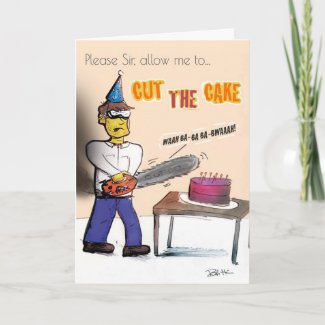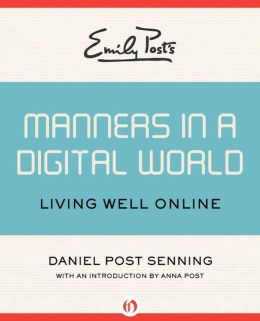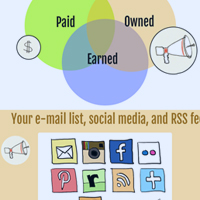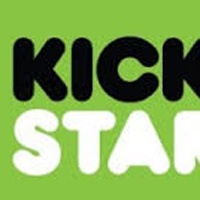How to save money buying food, a comprehensive guide.
by Brad Hines 1-19-16 12:35 pm
Changing your food purchasing habits can easily save hundreds, and even thousands a year; which I am sure you'd like instead for a vacation, paying off debt, or investing.
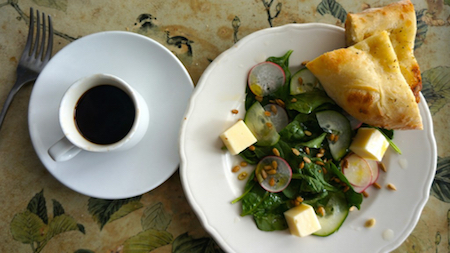
Most of the tips herein dovetail with healthy eating habits, and implementing such cost-savings methods often has the ancillary benefit of the confidence that comes from knowing how to cook, and knowing how to retain more of the money you earn, meaning that how much you earn is rendered less important. And that's pretty cool. Let's begin:
Beverages
What we drink is a whole food sub-category, where wasting money sneaks up on us fast. You can effectively eliminate worry about the entire category, by drinking nothing but healthy, life sustaining tap water. A good charcoal filter on a water tap is a great option against bottle water, which is technically a several thousand percent markup on your tap water. I make the exception for traveling to countries with dubiously clean water, but that's the only place I will buy bottled water. If drinking only tap water is too extreme for you, try to simply cut your soda or juice consumption in half, which are costly both per unit, and as fuel from empty calories. (Most foods from empty calories–picture conveience store food–most all, are a bad deal financially.)

There's a reason that in the personal finance world, the most pedestrian advice of "you will save hundreds by getting rid of your daily Starbucks coffee" has become so annoying mantra–it's because it's true. At about $3 for a daily Café Americano at Starbucks, a basic but nice espresso machine like the $99 De'Longhi EC155 becomes cost effective in your home in only a year, and without the crappy misspelling of your name given to you on a paper cup.
And a $25 purchase for home coffee, like a neat pour-over Aeropress is cost effective in only a few months–you'll love it for its portability, like while traveling *waiving my hands over it Price is Right style*
Coupons, Sales, Rebates
These should be a given, so instead I want to start by pointing out to beware of things like nonsensical sales, and to at least decode what a sale really means. "Buy 4 and get 1 free" is ostensibly a great deal, unless it's something like California Pizza Kitchen frozen pizzas that are a high markup item to begin with. Another way to look at is, 20% off when you buy 5, and do you need 5 to begin with? Reframing how a sale is worded has an amazing way of demonstrating how lame they are sometimes.
Head to the back of most major supermarkets. There is often a clearance shelf that has steeply marked down items simply because they came loose from their packages, got a little dented or whatever. Check this section every time for staples like cans of beans, out of season candy, etc.
Rebates are great, when you get an offer to earn back money later after the purchase by mailing something in. When these are offered, the seller is banking on you not actually mailing those rebates in, so disappoint them.
As far as coupons, subscribe to weekly flyers of the places you shop, and reap great savings with them, but with the understanding that there is no point to use a coupon for stuff you don't really need, just because something is on sale or has a coupon is not a reason to buy it.
...And use a list, and shop with habit
A great way to ensure you don't waste money on food with un-needed purchases in general is to get in the great habit of shopping both with a list, and when your stomach is full. Not only does this keep you from purchasing unnecessary food, but it helps keep healthier food in your home too.
Don't take this tip lightly, there is some neat neuroscience behind the shopping with a list concept, in short, willpower is like a reservoir in the brain, and the less choices you have to make, the more willpower you can retain. Same thing with being full incidentally, since that helps release serotonin in the brain, which also contributes to willpower. Doing shopping regularly in this method then creates a habit, that makes it even more easy to shop while sticking to your list.
Price matching
Know if your supermarket offers to match the price of items in other stores, and or if they discount beyond that. Ask, and know prices of different places in order to share with the store.
Don't forget to price match within the store as well across similar products that are the more basic version. For example things like berries may be cheaper to buy frozen then fresh, this especially doesn't matter if you are using them for something like cooking or blending a drink. Canned seafoods and vegetables may also be cheaper then their fresh counterparts.
Rain Checks
At a supermarket, usually when an item that was on sale is out of stock, you can go to the customer service desk and secure one of these which should entitle you to those items in the future at the sale price. Basically, you come back with the rain check, and it is a written voucher ensuring that you are entitled to the item at the former sale price despite the sale's closure.
Negotiating
I have successfully negotiated at big chain stores numerous times. This is done simply by finding items that are damaged in the store and then asking at the register if a markdown, usually performed by the manager, can be placed on the items. A lot of supermarkets do this in advance with things like baked goods and produce, where they will bag up older stuff they want to blow out the door.
Receipt Review
Stay on top of the the checkout screen and your receipt carefully at the time of purchase upon leaving the store, pricing errors not in your favor are common from a variety of reasons, as simple as the clerk double scanning, or sale prices not being updated in the register to reflect what's actually so.
Freeze Foods
Freezing foods is a great way to save money typically either for when you accidentally made too much food, or, in preemptive fashion, like when there is a sale on a certain food that you will not be able to eat that much of.
Things like herbs are great for freezing for off-season, or anything from your garden you harvested that you want to enjoy the rest of the year.
The ultimate freezing of foods happens when you take it to the next level, by freezing things after removing the air first. If you are really serious about freezer storage of foods, look into investing into a FoodSaver style vacuum. These sealer vacuums are not just great for extending food that you already have, they are perfect for getting to bulk up on stuff like meats when they are on sale, to use for the rest of the year.
Tracking the pricing of seasons
If you live in North America, and you are buying cantaloupe in December, you are probably paying a premium for it. While it is important to "eat from the rainbow" for health as they say, the reality is, there is probably something else also healthy for the same reason, in this case getting beta-carotene, from the instead in-season sweet potatoes that are available in December.
Remember, just because you see it at the supermarket, does not mean it is in season locally, rather it is likely being imported from far away at a price premium to you. There is such a variety (different colors) of fruits and vegetables from different times of year, it is absurd to suggest that there is a penalty to your health to wait until winter to eat oranges, because there is something else orange in season the rest of the year.
Don't chase "health" food for health sake
While we are discussing eating healthy, understand the perils of shopping to buy "health" foods, vs. eating healthy in a basic but encapsulating way. Once a product has been labeled and marketed as a health food, you can all but guarantee you are paying some kind of premium for it. Take Acai berry for example. While the food is perhaps marginally healthier than other superfoods, understand that it is almost never in such a way as to justify the price increase. In Dorchester Massachusetts, there is first store of a hopefully soon to be chain called The Daily Table, where their non-profit status will hopefully allow them to be a truly affordable health food store.
Getting into minutia about nutrition aside, 99% of being healthy is a combination of sleep, exercise, clear mind, and eating controlled portions of basic meals... don't bother chase that last 1% of maximizing your health, by paying double or triple for health food and supplements, until you are already doing everything else perfectly. Protein bars are a great example of this. The unit price to get 20 grams of protein out of a processed bar isn't worth it compared to a few spoonfulls of peanut butter, or a nice piece of lean meat out of your freezer and on the grill.
When you study some basic nutrition, you realize you don't need to pay others to "formulate" good health in eating for you, you do it effortlessly instead on your own, and better then them even. I make my own trail mix for example far healthier than most store ones, as well as cheaper.
Buy generic, and understand why
We all grew up with and love certain brands we have come to love and even expect while eating: Oreos®, Kraft® Mac and Cheese, Heinz® Ketchup, to name a few. It may be time for you to part ways with your proverbial security blanket of buying a certain brand that typically costs a 50-%150 premium in some cases over buying the boring looking counterpart.
One of the easiest ways to reconcile the emotional aspect of no longer buying a brand you like, is the blind taste test. Often times a store brand "cheddar cheese cracker" will taste just as good as Cheeze-it® crackers. If you can't tell the difference after a side by side taste test, you really have no excuse to buy the brand name one. If you are buying any food by brand name to impress people, then you have a costly financial problem to address of both buying the wrong things and for the wrong reason.
At stores, the generic version of a product is typically next to or beneath the product it imitates, since they don't have this shelving fee the big brands are paying. The generics are usually unmistakable, and are often made to  look the same, and sometimes even say on them "compare to [brand name here]". If you look at the ingredients, and not only they are the same, but they are in the same order, there is a good chance that not only does it taste the same, but it might even be from the same food plant sold with no label, back to the supermarket.
look the same, and sometimes even say on them "compare to [brand name here]". If you look at the ingredients, and not only they are the same, but they are in the same order, there is a good chance that not only does it taste the same, but it might even be from the same food plant sold with no label, back to the supermarket.
Each summer I make deep fried "Oreos®" shown right. By not actually buying Oreos® and getting the Stop and Shop or Market Basket ones instead, I save as much as $2 per bag. After deep frying in tasty pancake batter and fatty fat fat, I can't imagine possibly being able to notice a difference even if there was one.
Saving at restaurants
Start by getting into the mentality that there is no restaurant that is cheaper than home cooking the right way, even fast food is not as cheap–and this includes supposed time savings– especially if you have to factor in driving there or delivery.
In general it should be your goal to eat out less in order to save money. But when you do go to restaurants, understand that menus items are not priced effectively equally.
Almost a majority of family restaurants serve so much food, the average dish is really 1 1/2-2 servings of food. For this reason, rather than eat the entire thing for a blood sugar spike and a nap (which tells your body to store fat by the way) I eat about half of it and bring the rest home, where I eat the rest that night or the next day.
If you do frequently patron one restaurant, like the nutty family in Talladega Nights who decides to make a weekly outing of Applebee's–praise baby Jesus– then purchase a gift certificate to that restaurant, which many brands often offer a discount on the underlying face value of the card.
Breanna Reish, A CFP, adds "For restaurants, we tend to look for days that the kids eat free, we order water instead of a soft drink or tea, and our kids are small so we pay attention to portion size. A lot of the time restaurants give you way too much food so for now our kids can share with us, so there's no need to purchase separate kids meals."
Meal prep & general food prep
Another way to add a few hundred dollars to annual food budget savings, is your daily meal at work. Healthy lunches can be prepared the night before, and grabbed the next day, saving you not just money on your lunch (and the hassle of having to go out should you not want to) but doing so means that you get to control what goes into 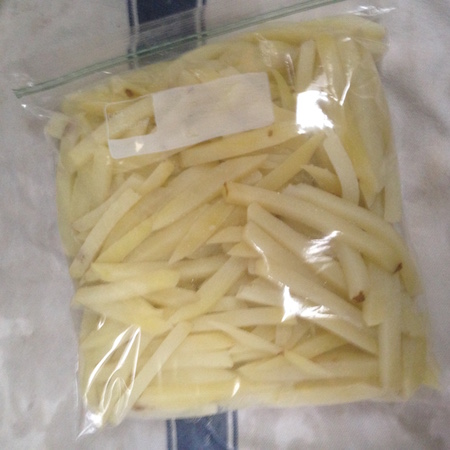 your food, and even give you something small to look forward to the next day.
your food, and even give you something small to look forward to the next day.
A general rule of thumb is that the more food is pre-prepared for you, the more it cost for what it is: think pre shredded cheese, pre-cut vegetables, even chicken wings, which you get buy cutting off a whole chicken for cheaper (although at a lot of supermarkets, the pre-cooked rotisserie chicken is actually a phenomenal deal).
If there's foods that you can put on autopilot both purchasing and preparing, do it. For example, let's say that at least 4-6 times a week you like to have baby carrots with your lunch. Make your own. Get a good chef's knife, and go to town one night a week preparing a seven day supply. I found myself making french fries a lot, so I started to freeze three pound bags of julienned potatoes I would cut myself. You can do this especially with things that can be frozen like soups.
Another food prep saving method is to plan your daily meals around what is on sale rather than what you fancy. A more stoic concept than some of the other methods, this means that if the supermarket has pork chops on sale for the day, then that is what you decide to eat that night. If you tend to switch up what you eat anyway, just go with the flow and plan your meals around the savings.
On a similar note, periodically check your refrigerator and plan your meals around what is in it that is about to go to waste from spoilage.
More popular foods for make yourself savings
Granola, trail mix, Picco De Gallo, cakes from cake mixes, soups, chili, baked beans, pancakes, bread crumbs, lemonade and the list goes on. If you eat it a lot, look up if you could make it yourself.
Supermarkets for lunch
There are always exceptions, like to avoiding pre-prepared foods. So if you are outside your home, hungry, without your prepack meal, and need to eat, the prepared foods/ala carte section at the supermarket where food is sold already cooked, and priced by weight, can be a cheaper, faster, healthier option than fast food. If you literally buy the lightest items like spinach, mixed greens, kale etc. and don't overload your tray, even at pricey Whole Foods, this usually won't exceed $4 (hint, don't get chicken wings! You're not going to eat the bones are you?).
You can then throw together a little ala carte lunch for $3-4 that is both healthier nourishment and portion than any option at a fast food places, as well as the same amount of time to purchase and you will know what went into it.
Avoiding food price traps
Think of all the places where the food is at an un-Godly markup, concession stands like the movie theater, airports, malls, football games. The other day at an Auto Show I saw $7 hot dogs. Never mind that the food is typically unhealthier in those places, but they capitalize on the fact that you are far away from other options. The last time you went to a mall, you may have been bombarded 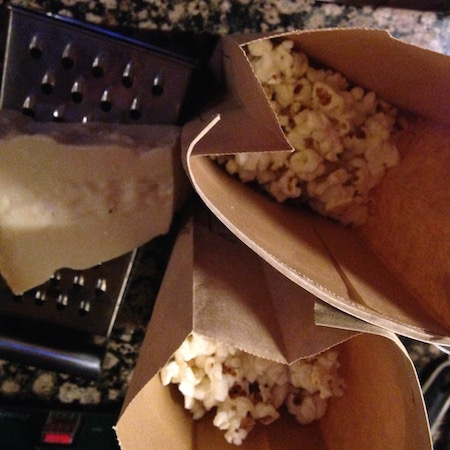 with scents of cinnamon, butter popcorn, and warm sugar designed to make you hungry.
with scents of cinnamon, butter popcorn, and warm sugar designed to make you hungry.
Any time you know you will be around tempting pricey food that you didn't intend to eat beforehand (like a nice restaurant outing) either bring food with you, or eat in advance. Better yet, eat in advance and then brush your teeth immediately after, which is known for curbing your desire to eat more food. I keep a tooth brush kit in my car, backpack, etc. just for this reason as well as the general good dental health and being sort of a dork.
I got tired of going to the movies and being tortured by all the popcorn eating around me. So I pop my own popcorn at home for mere cents, and put on it lime juice, or simply a little salt and grated Parmesan cheese. The 7-8 movies I have seen this year at my local theater's discount night, I've saved about an additional $40 by just bringing my own, and I get the candy at the dollar store down the street.
Buy in bulk when makes sense to –look at unit prices
In general at the supermarket or wherever else your purchase food, look at unit prices when presented. Literally pound for pound, you are going to want to look for the lowest unit price, not the lowest cost price, since there's different quantities sold item to item. The other day I saved $3 on a piece of salmon simply because the butcher cut it to size and left the skin on, rather than me getting the pre-sized, pre-cut, pre-skinned piece. I didn't even take the skin off, as the recipie called for it.
Be careful chasing unit price savings with items involving spoilage. A gallon of milk for example–vs. a smaller quart size container–is no longer worth purchasing, if you are single, practically lactose intolerant, and just going to end up pouring half of it down the drain.
If you join a wholesale club like Sam's, BJ's, Costco (are there any others?) buyer beware to price match discounts with what other stores are selling it for. Never assume that a month or year supply of anything is always cheaper.
If you love a particular item, and know that you use it more than others and never waste it, that's when it is time to look up "50lb bag of rice" or "50 lb bag of potatoes" on Amazon. I have drank green tea for years consistently, so I wouldn't mind buying like a year supply at a $10-15 discount, because I do in fact drink that much. Just make sure you have the space for it as well as considering the shelf life.
Distance to savings, and frequency of shopping consideration
Have an awareness of the possibility of different food items being cheaper at different places in your town or city, that merits shopping in more than one location. For example, you may have a "dollar store" nearby that's good for things like chocolate and tea, a local farmer's market offering the best priced vegetables and fruits, a super market for most other items, and perhaps another place entirely for alcohol. Taking all of that into consideration, and then throwing in online food shopping into the mix, it is now up to you to calculate the total effective savings of each place respectively and where it is worth it for you to visit based on your time and your transportation costs. For some it may makes sense to go to a bunch of places, for some it may only to only patron one. Especially if you are time poor, and earn a lot of money at an hourly rate, you will want to look into auto-pilot style purchases like Amazon pantry.
I love Target for example, but at a thirty minute drive away and with average car operating costs north of $.50 cents a mile, it's not necessarily wise for me to drive there for one case of sparkling water and I certainly am not taking a rideshare car there either. Instead, I may drive there monthly or quarterly, and purchase all the pantry style items I know I need for a certain period of time.
All things being equal, when you are at the place that sells the cheapest chocolate, buy your chocolate.
I know a lot of people who live in expensive cities like New York and San Francisco, who have very little time, no car, and for them, Amazon Pantry and similar services actually makes sense financially. I recommend if you choose to go with the convienience of having food shipped to you, like Peapod, Pantry, and Target Red items, that not only do you make sure that it is in fact worth it for you financially, but that you put only the most bare essentials, like toilet paper on the default buy and sip to you list. One of the quickest ways to be a poor saver is to have spending on auto-pilot, so tread carefully with this one.
Growing your own
Growing your own food–or even hunting–can be a rewarding way to get food directly from the source to your table with no middle man, travel, and delivery. The things you need to discount when making the decision to grow or buy, is how much you enjoy or don't enjoy gardening, if you have the ability to grow things effectively, or better put, what you can grow effectively.
While it's not likely going to make sense to try and harvest your own wheat for milling into flour, or buying a cow for the milk, even a city dweller can reap the benefits of growing their own herbs, tiny tomatoes, mushrooms and more, over their sink. It's fun and financially rewarding for you perhaps to have a few basil pots for your soups and sauces rather then buying the otherwise sometimes pricey market item all the time. So have a plan, and don't forget to factor in total costs like potting soil, fertilizer, stakes, bulletts if you hunt, etc. I like this starter set of 12 different herb seeds on Amazon for example.
Ultimately a lot of the decisions outlined in this article are ones that make sense, if they make sense for you. I have a friend whos family loves eggs, he indeed went out and built a chicken coop and got nine chickens, and it is very cost effective for him for those reasons.
Eliminate food waste
If the moral imperative of not wasting food doesn't concern you, remember that food waste is of course money waste:
-Extras? Fridge it or freeze it. I no longer eat a whole pizza or large sub in one sitting, since it's one less meal to cook having the rest later.
-Know your own tendency to "have eyes bigger than your stomach" and adjust accordingly at both restaurants and when cooking at home. Keep in mind that being slightly hungry is typically a healthier and more energized state than being slightly full, you can always eat more later.
- Organize your refrigerator with a clear and visually pleasing way to access your foods as to both encourage eating that healthy bag of spinach you bought on a good intention, and to make sure that you don't discover it in the back of the little vegetable drawer a month later when it is all wilty.
-The really stoic and just plain tough of all of you can re-use things. For example, a once used tea bag can be used 2-3 more times (especially as a now decaffeinated tea as steeping the first time eliminates the majority of caffeine.)
-Learn to make natural home cleaners by using things like rubbing alcohol, lemon, vinegar, and baking soda. This is a whole topic by itself I will skip, but know that I studied some crunchy flaky natural whole living koombaya websites last summer not to save the environment (but that's not too shabby) but simply to not have to waste money on often harsh-for-the-skin cleaning agents. So I do things like using left over lemon wedges to do anything from flavor water, clean grease off my hands, or keep apple slices from going brown as one example.
-When getting food ready for company visiting your home, whether making the food yourself or hiring a cater (guess which you should probably do?), always err towards purchasing less food than you think you need. The psychology of the economics of scarcity suggest that all things being equal, you running out of food is going to have people talking about how great the party and food was more than there being a ton of food left over. No one ever died that a party ran out of food, and think of how many you have been to where there was a depressing amount left over going to waste likely.
- Used leftovers the next day to get started a new meal, chicken parts for soup stock, beef for beef stock respectively. Similarly, used left over meat sauce for chilies, etc.
-The vacuum sealer as I mentioned. Get one and have it pay for it self with frequent use.
-Don't stock your kitchen before traveling except for things like dry goods or soups or something frozen that you could have when you return home.
Get family in on it
Chances are it will be harder for them than on your own accord, but if you can get your family into eating affordably, it will help you foot the bill. If you can get kids motivated about nutrition for example, it's easier for them to not pester your about pricey snacks and sodas. If your family sucks at underdstanding, spouse included, try to go to the shopping alone without them, it usually is faster too.
 Learn to cook and appreciate food
Learn to cook and appreciate food
Learning cooking has an indirect and back-door way to saving money that may be unexpected, that is, it helps you to devalue the restaurant experience, and luxury food items at stores. When you can begin to make beautiful and high end meals in your own home, it can help free up a mental clutch that needing to go out to eat may have on you.
Learning culinary methods (as opposed to recipes) is a simple way to begin. When you de-mystify cooking you get involved in the process and it becomes easier to no longer covet a lot of foods because you realize you can, and will, do it yourself. As an example, I made the decorated cupcakes above by using tines of a fork, an old French baking tip, because I don't want to spend $2-3 on an "artisinal" cupcake. Close enough!
If you have a great food savings tip, please leave it in the comments below.
advertisement:
I recommend Bluehost as a website hosting provider for their affordability, ease of use, and customer service.
and viglink for earning blogging income.



 look the same, and sometimes even say on them "compare to [brand name here]". If you look at the ingredients, and not only they are the same, but they are in the same order, there is a good chance that not only does it taste the same, but it might even be from the same food plant sold with no label, back to the supermarket.
look the same, and sometimes even say on them "compare to [brand name here]". If you look at the ingredients, and not only they are the same, but they are in the same order, there is a good chance that not only does it taste the same, but it might even be from the same food plant sold with no label, back to the supermarket. your food, and even give you something small to look forward to the next day.
your food, and even give you something small to look forward to the next day.  with scents of cinnamon, butter popcorn, and warm sugar designed to make you hungry.
with scents of cinnamon, butter popcorn, and warm sugar designed to make you hungry.  Learn to cook and appreciate food
Learn to cook and appreciate food

